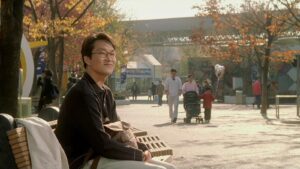The posters for South Korean filmmaker Jin-ho Hur’s Christmas in August (1998) show a man and a woman standing closely together under an overcoat, awkwardly and amorously smiling, as the snow falls from above. The poster and the genre (drama/romance), may make you wrongly interpret this as a passionate love story, riddled with melodramatic gestures. On the contrary, Christmas in August is an unbelievably restrained drama that explores the human condition, occupied by thoughts of love, loss and desire.
In the film’s opening frame we see a smiling, bespectacled young guy, in his early 30s, riding his scooter. He is named Jung-won (Suk-kyu Han) and comes across as a good-natured man living a peaceful life in the suburbs.
Jung-won owns a small photo studio. He is single and lives with his infirm father. Occasionally, he visits his sisters’ family and enjoys a few drinks with the friends. But, Jung-won seems stuck in the past, while experiencing a rapidly moving present and we soon learn he has no future. We see him wait in the hospital lobby and his family members talk about an ‘illness’, although Jung-won only silently contemplates the imminent death.
Nevertheless, Jun-won suddenly meets a beautiful, full-of-life meter maid (or parking officer) Da-rim (Eun-ha Shim), who is assigned to the neighborhood. She regularly visits Jun-won’s studio to develop proof of infractions (for the parking ticket she writes). An elegant friendship develops between the two. They barely talk, but their silence and smiles seem to convey a lot.
Christmas in August, in many ways, is reminiscent of classic Japanese cinema, especially in the manner it captures the sublime beauty in simple things. Each of the scenes is astoundingly staged by director Jin-ho Hur and cinematographer Yoo Young-kil. Almost every scene imbues images and gestures that are talking about life and death. Children, full-of-life, occupy the gracefully composed frames, while loss and yearning for the past hangs in the air.
When Jun-won wakes up from sleep (sunlight streams into his room), in the episodic opening sequence, we hear from the principal in a nearby school, talking about ‘new year resolutions’.
A little later Jun-won walks through an empty playground, a crematorium, which just seems to insist on what’s lost and what’s going to be lost. Thereon, the whole narrative is about how Jun-won lives his life to the fullest in this atmosphere of inevitable doom.
Doctors don’t appear in the story, explaining us what’s ailing the guy. Unlike, most of the terminal illness films, Christmas in August doesn’t treat the illness as the central talking point. When Jun-won tells his friend that he’s going to die, it’s refuted as a joke.
Half an hour into the film, it becomes almost hard to believe, how a person could stay composed knowing he is going to die soon.
And then comes the scene in the police station, when Jun-won’s placid facade drops down, illuminating his dreadful feelings about death. It’s heartbreaking, learning how hard he’s tried to mask the feelings of fear and guilt with a little smile.
Barring a scene where Jung-won writes little instructions for his father to run the photo shop after he’s gone, there isn’t an iota of melodrama or contrived emotions. Even that particular scene isn’t simply to evoke sentiment. It fits well with Jun-won’s diligent characterization.
Although there are no dramatic twists and turns, the film never for a moment feels dull. It’s because of the impeccably staged sequences and sublime performances from the lead actors.
One of my most favorite scenes is when an elderly woman, with a touch of make-up, comes to Jun-won’s shop to take a memorial portrait (to memorialize the person after death). The script spectacularly focuses on the affinity between Da-rim and Jun-won without including a quick scene of them consummating their relationship. There are the usual awkward inter-plays involved in a courtship. But for the large part, their gleaming eyes hook us to the screen more than spoken words.
Suk-hyu Han and Eun-ha Shim’s portrayal of the lead characters are so low-key and pure, it would be criminal to call them ‘performances.’
One of the best Korean movies, Christmas in August (97 minutes) is a genuinely moving, invigorating drama that celebrates the best in human nature. It imparts a subtle, vital life lesson for all those who take their life for granted.

